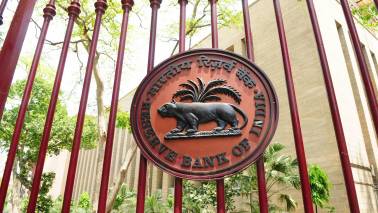The talks between the two leaders came a day after officials of India, the US, Japan and Australia held their first meeting to give shape to the much talked about quadrilateral alliance to keep the Indo-Pacific region "free and open".
Prime Minister Narendra Modi today held "very expansive" talks with US President Donald Trump during which the two leaders carried out a "broad review" of the strategic landscape in Asia, signalling deeper cooperation by the two countries in dealing with sensitive security issues confronting the region.
The talks between the two leaders came a day after officials of India, the US, Japan and Australia held their first meeting to give shape to the much talked about quadrilateral alliance to keep the Indo-Pacific region "free and open".
It is learnt that China's rising military presence in the South China Sea figured in talks between Modi and Trump apart from a host of other regional and global issues, including terrorism emanating from Pakistan, North Korea's missile tests, situation in Afghanistan and the Gulf region as well as consequence of violence in Myanmar's Rakhaine state.
The White House said the two leaders discussed the comprehensive strategic partnership between the US and India and their shared commitment to a free and open Indo-Pacific region.
In the 45-minute-long meeting, which took place on the sidelines of the ASEAN summit, Modi told Trump that both nations can rise beyond bilateral ties and work jointly for the future of Asia, adding that India will try to "live up to the expectations" of the US and the world.
Giving details of the deliberations, Foreign Secretary S Jaishankar said Modi and Trump undertook "a broad review of the strategic landscape in Asia" without further elaboration.
Asked whether the formation of India-Australia-the US- Japan quadrilateral was discussed, Jaishankar said there was a passing mention of it, adding that the meeting of the officials of the four countries was part of diplomacy.
"It was a very expansive discussion," Jaishankar said, adding that Trump also shared his "impression" of his ongoing Asian trip which also took him to Japan and China.
The White House, in a statement said the two leaders pledged to enhance their cooperation as Major Defense Partners and resolved that two of the world's great democracies should also have the world's greatest militaries.
"President Trump expressed appreciation that Indian purchases of oil from the United States have surpassed 10 million barrels in recent months, and expressed confidence that stronger energy cooperation will be a geopolitical and economic game changer for both countries," it said.
Modi said he was looking forward to the visit of Trump's daughter Ivanka to Hyderabad later this month and also extended an invitation to the US president to visit the country.
On bilateral front, the foreign secretary said the two leaders discussed boosting two-way trade and investment and defence cooperation.
The thrust was on how to grow trade and increase market access, he added.
Earlier, Modi told Trump that "the cooperation between India and the US can rise beyond bilateral cooperation and both countries can work for the future of Asia and the world...We are moving ahead together on many issues".
The US has been pitching for greater Indo-US cooperation in the strategically key Indo-Pacific region where China has been ramping up its military presence.
"Wherever President Trump has gone and wherever he got an opportunity to talk about India, he spoke very highly about India. He expressed optimism about India and I am assuring that the expectation the world has, the expectation the US has, India has been trying to live up to that expectation and will continue to do it," Modi said.
After the talks at the Sofitel hotel where Trump is staying, Modi tweeted "Held productive talks with @POTUS on further strengthening India-USA relations. @realDonaldTrump".
National Security Advisor Ajit Doval, Foreign Secretary S Jaishankar, Secretary (East) in the MEA Preeti Saran were part of the Indian delegation while US Secretary of State Rex Tillerson and National Security Adviser H R McMaster accompanied Trump at the talks.
In the meeting, Trump described Modi as a friend.
"It's great to have Prime Minister Modi here. We've had him at the White House, and he's become a friend of ours and a great gentleman doing a fantastic job in bringing around lots of factions in India - bringing them all together," Trump said according to the transcript released by the White House.
"It's a lot of good reports coming out of India. So I want to congratulate you," he told Modi.
The two leaders are understood to have discussed the security scenario in the region besides several other issues of mutual interests, including ways to further boost bilateral trade.
The move to set up the quadrilateral alliance comes in the backdrop of growing Chinese assertiveness in the South China Sea. The US has been favouring a larger role for India in the strategically key Indo-Pacific region.
The use of the term "Indo-Pacific" by President Trump has led to speculation that it may have something to do with Washington preparing the ground for a revival of the so called Quadrilateral strategic alliance between the US, Japan, Australia and India to counter China's rise.
Trump on Friday praised India's "astounding" growth after it opened up its economy and also lauded Modi, saying he has been working successfully to bring the vast country and its people together.
Speaking at a gathering of CEOs on the sidelines of the annual Asia-Pacific Economic Cooperation (APEC) summit in the Vietnamese city of Danang, President Trump cited India as one of the countries in the Indo-Pacific region making strides.
He praised India as a sovereign democracy with a population of over 1 billion as well as the largest democracy in the world.
Soon after the meeting of their officials yesterday, India, the US, Japan and Australia issued separate statements listing the Indo-Pacific region as the major area of the their discussions and resolved to work towards upholding a rules- based order and ensuring respect for international law in the region, seen as a message to China.
















